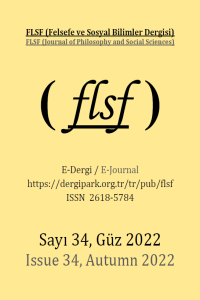Abstract
Bu çalışmada, Platon’un Kratylos adlı metninden hareketle iki farklı görüş olan uylaşımcılık ve doğalcılık üzerinden adların doğruluğu tartışması ele alınacaktır. Bu tartışma adların işlevi, adlar ile onların adlandırdıkları şeyler arasındaki ilişki, bir şeyin kaç doğru adı olabileceği ve son olarak adların ilk verilmesiyle ilgili dört ana savı içermektedir. Peki, adların doğruluğu üzerinde yükseldiği zemin anlam mıdır, yoksa sözcüklerin kendileri midir? İşte bu soru çerçevesinde adların kökeni incelenecektir. Sonrasında Kratylos’un temel sorunsalı olan dil ve kavramsal içerikleri irdelenecek; sonuç bölümünde ise çalışmanın asıl amacı olan adların kökeni sorusuna Platon açısından bir yanıt verilerek, genel bir değerlendirme yapılacaktır
References
- 1. AKARSU, Bedia. Dil-Kültür Bağlantısı, İstanbul: İnkilâp Yayınevi, 1998,3.baskı.
- 2. AYSEVENER, R.Levent. “Kratylos: Adların Doğruluğu ve Bilgi”, Hacettepe Üniversitesi Edebiyat Fakültesi Dergisi,2002,Cilt: 19 / Sayı: 2,ss. 153-166.
- 3. GÖREN, Erman. Kratylos’a Yorumlar 2.Cilt, İstanbul: Dergâh Yayınları, 2016.
- 4. Platon, Kratylos 1.cilt, çev., Erman Gören, İstanbul:Dergâh Yayınları, 2016.
- 5. Platon, Diyaloglar, çev., Teoman Aktürel, İstanbul: Remzi Kitabevi, 2011, 8.baskı.
- 6. Pfeiffer, Rudolph. History of Classical Scholarship. 1st Printing Edition. Oxford: University Press, 1968.
- 7. SOYKAN, Ömer Naci. Arayışlar Felsefe Konuşmaları-1, İstanbul: Küreyel Yayınları, 1998.
Abstract
In this study, deriving from the text of Plato’s Cratylos, two different views will be discussed, namely the discussion of correctness of signifiers over naturalism and conventionalism. This discussion includes four main arguments: the function of signifiers, the relation between signifiers and the signified, how many correct signifiers one signified could have and finally how signifiers were given in the first place. Then, is the basis on which signifiers stand the meaning itself or the words themselves? The root of signifiers will be discussed within this framework. Following this, language and the conceptual content composing the main problem area of Cratylos will be investigated. In the conclusion part, the question of the roots of signifiers which is the main research question will be answered based on the framework of Plato and a general evaluation will be presented.
Keywords
Plato Cratylus Language Roots of Signifiers Correctness of Signifiers Conventionalizm Naturalizm
References
- 1. AKARSU, Bedia. Dil-Kültür Bağlantısı, İstanbul: İnkilâp Yayınevi, 1998,3.baskı.
- 2. AYSEVENER, R.Levent. “Kratylos: Adların Doğruluğu ve Bilgi”, Hacettepe Üniversitesi Edebiyat Fakültesi Dergisi,2002,Cilt: 19 / Sayı: 2,ss. 153-166.
- 3. GÖREN, Erman. Kratylos’a Yorumlar 2.Cilt, İstanbul: Dergâh Yayınları, 2016.
- 4. Platon, Kratylos 1.cilt, çev., Erman Gören, İstanbul:Dergâh Yayınları, 2016.
- 5. Platon, Diyaloglar, çev., Teoman Aktürel, İstanbul: Remzi Kitabevi, 2011, 8.baskı.
- 6. Pfeiffer, Rudolph. History of Classical Scholarship. 1st Printing Edition. Oxford: University Press, 1968.
- 7. SOYKAN, Ömer Naci. Arayışlar Felsefe Konuşmaları-1, İstanbul: Küreyel Yayınları, 1998.
Details
| Primary Language | Turkish |
|---|---|
| Subjects | Philosophy |
| Journal Section | Research Article |
| Authors | |
| Publication Date | December 10, 2022 |
| Submission Date | August 23, 2022 |
| Acceptance Date | November 6, 2022 |
| Published in Issue | Year 2022 Issue: 34 |
Starting from 2024, our journal will be published in 3 issues as two regular and one special issues. These issues will be published In May (regular issue), September (special issue) and December (regular issue).
Only articles within the scope of the file will be included in our special issue.
Thank you for your attention.

